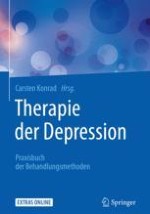2017 | OriginalPaper | Buchkapitel
11. Praxis der Kombinations- und Augmentationsbehandlung bei Nichtansprechen auf antidepressive Monotherapie
verfasst von : Max Schmauß, Thomas Messer
Erschienen in: Therapie der Depression
Verlag: Springer Berlin Heidelberg











